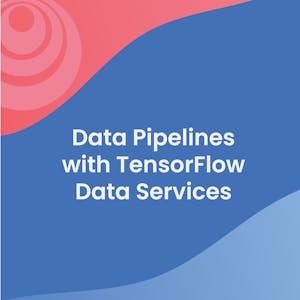Data Pipelines with TensorFlow Data Services
Bringing a machine learning model into the real world involves a lot more than just modeling. This Specialization will teach you how to navigate various deployment scenarios and use data more effectively to train your model.In this third course, you will:
- Perform streamlined ETL tasks using TensorFlow Data Services
- Load different datasets and custom feature vectors using TensorFlow Hub and TensorFlow Data Services APIs
- Create and use pre-built pipelines for generating highly reproducible I/O pipelines for any dataset
- Optimize data pipelines that become a bottleneck in the training process
- Publish your own datasets to the TensorFlow Hub library and share standardized data with researchers and developers around the world
This Specialization builds upon our TensorFlow in Practice Specialization. If you are new to TensorFlow, we recommend that you take the TensorFlow in Practice Specialization first. To develop a deeper, foundational understanding of how neural networks work, we recommend that you take the Deep Learning Specialization.
Perform efficient ETL tasks using Tensorflow Data Services APIs
Construct train/validation/test splits of any dataset - either custom or present in TensorFlow Hub Dataset library - using Splits API
Use different modules and functions of the TFDS API to prepare your data for training pipelines
Identify bottlenecks in your input pipelines and increase your workflow efficiency by input parallelization
Syllabus
Syllabus - What you will learn from this course
Week 1
Data Pipelines with TensorFlow Data Services
Week 2
Splits and Slices API for Datasets in TF
Week 3
Exporting Your Data into the Training Pipeline
Week 4
Performance
FAQ
When will I have access to the lectures and assignments?
Access to lectures and assignments depends on your type of enrollment. If you take a course in audit mode, you will be able to see most course materials for free. To access graded assignments and to earn a Certificate, you will need to purchase the Certificate experience, during or after your audit. If you don't see the audit option:
The course may not offer an audit option. You can try a Free Trial instead, or apply for Financial Aid.
The course may offer 'Full Course, No Certificate' instead. This option lets you see all course materials, submit required assessments, and get a final grade. This also means that you will not be able to purchase a Certificate experience.
What will I get if I subscribe to this Specialization?
When you enroll in the course, you get access to all of the courses in the Specialization, and you earn a certificate when you complete the work. Your electronic Certificate will be added to your Accomplishments page - from there, you can print your Certificate or add it to your LinkedIn profile. If you only want to read and view the course content, you can audit the course for free.
Is financial aid available?
Yes. In select learning programs, you can apply for financial aid or a scholarship if you can’t afford the enrollment fee. If fin aid or scholarship is available for your learning program selection, you’ll find a link to apply on the description page.
Why was Course 3: Data Pipelines with TensorFlow Data Service updated in October 2020?
Changes in TensorFlow API: Since this Specialization was launched in early 2020, there have been changes to the TensorFlow API which affect the material in Weeks 1 and 2. With this refresh, you can access updated lectures, quizzes, and assignments.
Changing the Difficulty Level of Assignments: Based on valuable learner feedback, we’ve revised the Week 4 assignments to ensure that you have a full grasp of the foundational principles and are well-prepared to tackle them.
Reviews
I understand why most of the students are furious about, but content wise, it one of those extremely helpful and important courses in Coursera. Really loved it!
This course many for challengging in code but, before it, i learn it in my college. So, i do this assignment.
Excellent course both for Data Scientists and Machine Learning Engineers!
I learned a lot from this course about how to optimize TensorFlow data pipelines and how to create public datasets. Thank you! - Steve
